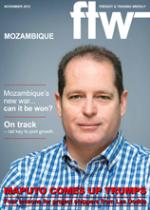A new struggle faces the
people of Mozambique
20 years after the ending
of the civil war with the
signing of the Rome Accord on
October 4, 1992.
This time the fight is for
jobs, breaking the poverty
cycle, and creating a reason
to hope for the youth of the
country.
More than half of the present
population of Mozambique
is under 18, which means
they have no memory of the
devastating 16-year civil war
in which a million people died
and rural infrastructure and
society were largely destroyed.
Instead, they face a daily war
against hunger and joblessness
– and they are getting angry.
“There is no peace when
we have more Mercedes and
fewer hospitals... when we
have more mega-projects and
more unemployment,” the
president of Mozambique’s
“Youth Parliament”, Salomao
Muchanga, said in a statement
published in the daily
newspaper CanalMoz on
the anniversary of the Rome
Accord.
Squatter settlements in and
around Mozambican cities bear
testimony to the challenges still
facing those whose families
fled the fighting. Many live on
as little as US$1 a day.
But the government has
a new arsenal of powerful
weapons with which to fight
the poverty trap.
Massive reserves of coal, oil
and gas, as well as the revival
of the agricultural sector,
promise to unlock massive
economic growth.
Private public partnerships
have been entered into with
port and rail operators in order
to build up the infrastructure
needed to handle the growing
flow of cargo in and out.
The rapidly expanding
economies of Mozambique’s
neighbours add more strings to
the bows of policy-makers and
leaders – and support investors
in the country’s ports and
railways.
There are also signs that the
Mozambican manufacturing
sector is starting to revive,
according to the International
Monetary Fund’s (IMF)
Regional Economic Outlook:
Sub-Saharan Africa.
This has been accompanied
by “rapid average labour
productivity growth”.
One of the challenges facing
all industries – including
logistics and freight – is the
lack of skills. According to
the IMF report, Mozambicans
averaged 3.4 years of schooling
in 2010 – which is up from the
2.4 in 1995.
Mozambique has the
advantage of being able to
learn from the mistakes of
others after literally striking it
rich. There are signs that the
authorities understand the risks
of non-inclusive economic
growth.
A statement issued by an
IMF mission to Mozambique
in March “welcomes the
authorities’ commitment
to accelerating poverty
reduction and the initial steps
in implementing the 2011-14
Poverty Reduction Strategy
(PARP).
“The mission concurs with
authorities’ structural reform
priorities. It welcomes their
sustained commitment to
further strengthening financial
sector development, public
finance management, tax
policy and administration, debt
management and investment
project selection, natural
resource management, and the
framework to fight corruption
and money laundering,” it
adds.
Whatever happens, freight
will need to move.
But it will be a whole lot
easier to be profitable in a
country at peace with itself,
and in which the wealth is
more evenly shared.
CAPTION
Trucks and bicycles share the entrance road for container traffic into the port of Beira.

